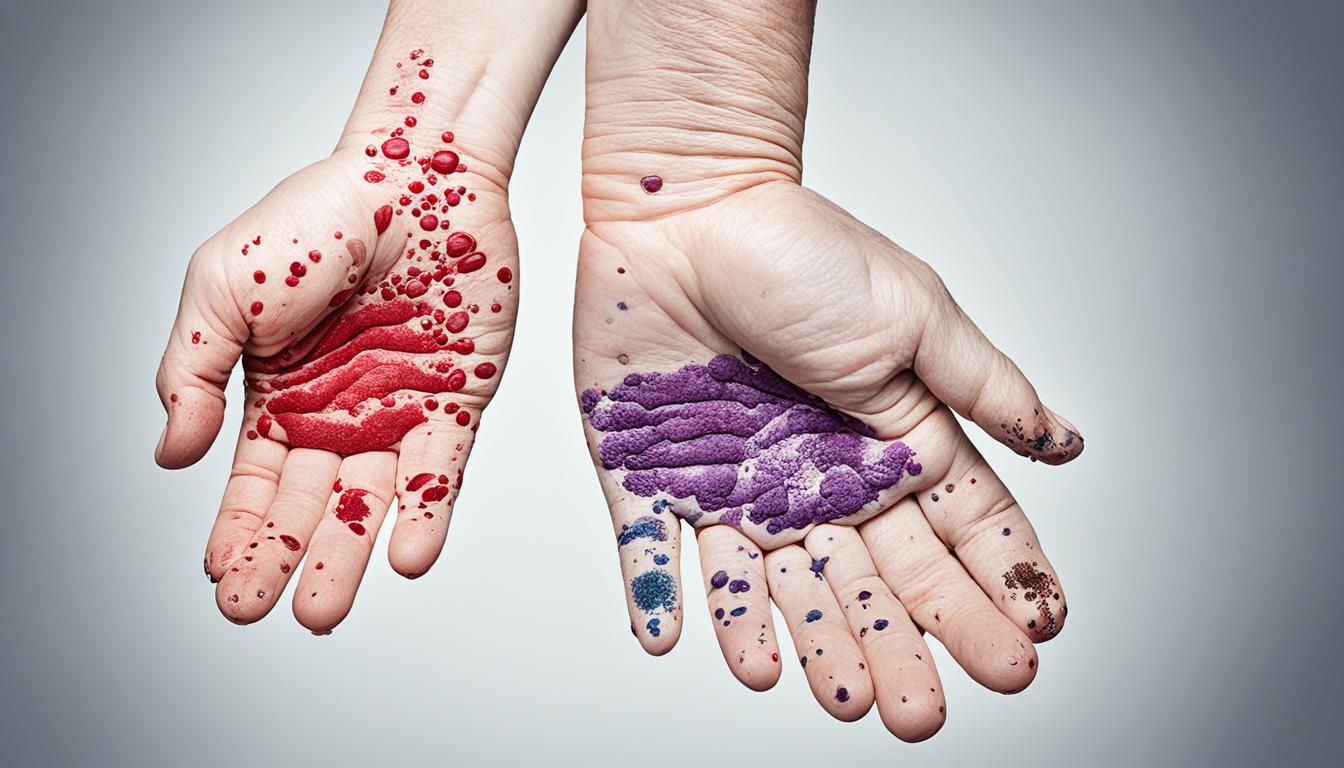Stevens-Johnson syndrome (SJS) is a rare but serious disorder. It causes painful blisters and lesions on the skin and in the mouth. It’s mainly a reaction to medicines or infections.
For those with SJS, it starts with flu-like symptoms like fever. Soon, a rash appears and turns into blisters. The blisters show up on the skin and in areas like the mouth and eyes. It can also cause swelling in the face and throat, which is very painful.
The main triggers are severe drug allergies or infections. Some specific medicines can cause SJS in certain people. Infections like the cold or flu are also linked to it, especially in kids.
To diagnose SJS, a doctor, often an eye and skin specialist, does a deep check. They look at your health history and might take a small skin sample for tests. This helps confirm if it’s SJS.
If you have SJS, you need quick treatment to ease symptoms and prevent issues. Some might need to stay in the hospital. Doctors give a special immune treatment and take care of your wounds. They also focus on your eyes to prevent vision problems.
Good care and treatment can make a big difference in how you feel. It focuses on making your life better and avoiding serious conditions.
Key Takeaways:
- SJS causes painful blisters and lesions on the skin and mucous membranes.
- It is typically a severe reaction to certain medications or infections.
- Flu-like symptoms, followed by a rash that blisters and peels, are common in individuals with SJS.
- Diagnosis involves a thorough medical evaluation by an ophthalmologist or dermatologist, including a medication history and physical exam.
- Prompt treatment and specialized care are essential to manage symptoms and prevent complications.
Risk factors and complications of Stevens-Johnson syndrome
Stevens-Johnson Syndrome (SJS) is a serious condition that could be life-threatening. It has many risk factors and complications. Knowing these can help prevent and treat SJS.
Risk Factors
Some things can make someone more likely to get Stevens-Johnson Syndrome. One big risk is having reacted badly to certain medicines before. This means if you’ve had SJS symptoms from some drugs, you might get it again if you take those drugs.
Having a weak immune system, or having HIV/AIDS, also ups your SJS risk. A healthy immune system keeps us safe from illness. But if it’s weak, it can’t fight off certain drugs or skin reactions well.
People getting chemo are more at risk, too. Chemo can lower your immunity, making it harder to fight off drug side effects. Doctors need to watch these patients closely to catch and treat SJS early.
If you have family members who had SJS, you might be more likely to get it. Knowing your family’s medical history is key. Talk to a doctor if you’re worried.
SJS is more common in children, especially when they have common sicknesses like colds. These illnesses can set off a strong reaction in their body, which might lead to SJS.
Complications
SJS can cause many problems that need quick medical care. It mainly harms your skin, mouth, eyes, and sometimes internal organs, causing short and long-term issues.
It often damages the conjunctiva, the tissue covering your eyes. This can lead to eye dryness, redness, pain, and sometimes vision loss.
In serious cases, it can harm the cornea, the eye’s outer clear layer. Corneal issues can scar the eye, leading to further sight problems or even sight loss.
Another issue is dehydration from skin blistering. It’s important to stay hydrated and keep your electrolytes balanced during SJS treatment.
Sometimes, SJS can cause sepsis, a dangerous body-wide infection. Broken skin and mucous membranes let bacteria in, raising the risk of severe infections.
It can also bring on breathing problems if it affects the airways. Swelling in the throat and airway can make it hard to breathe, needing quick medical help.
Managing these factors and complications is key to treating SJS. Quick medical care, special skin treatment, and regular check-ups can lessen SJS’s health and life effects.
Diagnosis and treatment of Stevens-Johnson syndrome
Diagnosing Stevens-Johnson syndrome (SJS) needs a deep medical look. An eye or skin doctor will check what medicines the patient takes. They might need to do a skin test to be sure.
In the hospital, doctors must act fast. They stop the drugs causing issues and look for the reason behind the body’s bad reaction. SJS patients often need special care, including IVIG therapy to help their immune system.
Wound care is crucial. Doctors keep the skin clean and watch for infections. Eye care is just as important because SJS can harm the eyes. Eye doctors work hard to protect the patient’s vision.
SJS is very serious. It might cause scarring or dehydration. In worst cases, it can lead to sepsis or lung problems. Early and careful treatment is key to help patients survive and heal well.

